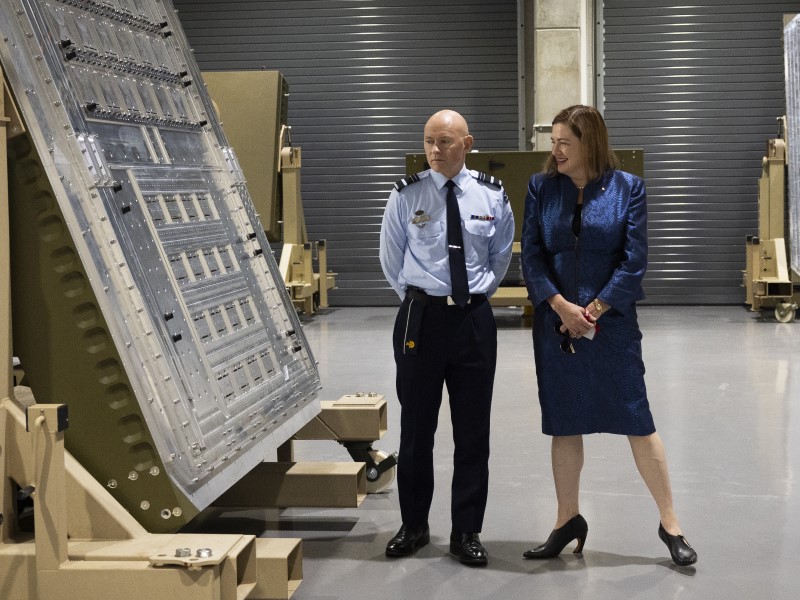Defence will launch a trilateral AUKUS innovation challenge on electronic warfare within months and move towards a foreign sales arrangement where government act as an intermediary, as the Albanese government looks to intertwine the nations’ industrial bases.
Speaking at the launch of the federal government’s Defence Industry Development Strategy (DIDS), chief defence scientist Professor Tanya Monro said the electronic warfare challenge will be the first of “a regular drumbeat” of AUKUS innovation challenges.
She said it represents a “profound shift” for Defence industry and capability development.
By issuing the same technology challenge across all three countries simultaneously, first confirmed in December, the program aims to create opportunities for trilateral cooperation. One of the key areas of focus under the DIDS is to strengthen export opportunities with trusted partners, particularly AUKUS nations, to help Australian small to medium-sized businesses (SMEs) grow.
Defence will also pursue its own version of the US Foreign Military Sales office and reform the Global Supply Chain Program to let larger firms participate.

Professor Monro said the innovation challenges will provide mutual oversight of what the “AUKUS nations have to offer” and enable them to “very quickly accelerate the best of breed from each of our nations for solutions”.
“What we’re working towards is bringing together the best elements of each of our nation’s industrial bases and R&D bases,” Professor Monro said.
The challenges will be led through the ASCA in Australia, the Defense Innovation Unit in the United States, and the Defence and Security Accelerator in the United Kingdom.
The new DIDS also launched Thursday outlines a need for more industrial collaboration with AUKUS allies and to bring the local industry into capability development at earlier stages.
“The earlier Australian defence industry is involved in the development of capability (co-development), the easier it is to become part of a global supply chain (co-production),” the strategy reads.
Outside of the AUKUS nations, the federal government wants more government-to-government agreements to sell Australian Defence industry products to other countries through contracts with the Commonwealth.
This could be delivered be an agency similar to the US Foreign Military Sales office, Defence Industry minister Pat Conroy said Thursday.
The US office facilitates sales of US defence goods and services at a massive scale and Mr Conroy acknowledged Australia’s version will not be at “that level of depth given the size of the US Defence industry”.
“The agreements are really about supporting the credibility of Australian Defence Industry by backing them with the Australian Government. In some areas, they’ll still be commercial arrangements where an Australian company will sell to an overseas country, but in other cases, it makes sense to sell through the Australian government.”
The Albanese government also hopes to drive greater export potential for local Defence industry companies through an expansion of the Global Supply Chain Program (GSCP). The program issues grants to Defence prime contractors to support activity that lets them “find, advocate and provide contract opportunities” to Australian firms, according to Defence.
Updates to the GSCP contract and performance framework announced in the DIDS include a removal of the requirement that Australian businesses have less than 200 employees, an expanded scope of exports to consider “the continuum between domestic and international projects”.
New performance metrics to measure the success of the program will also be introduced as well as expanding the number of primes that can participate.
“Once you’ve got over a certain number of employees, an Australian company wasn’t eligible to be part of the GSC program, which meant an overseas prime couldn’t partner with a medium sized Australian company like CEA and have that as part of their global supply chain initiative,” Mr Conroy said.
“We’ve got a lot of Defence SMEs, I want to grow those SMEs into medium sized companies. And I want them to still be eligible for the global supply chain initiative as a way of getting them into projects around the world.”
Mr Conroy also acknowledged that incoming changes to the defence export controls “will pose some challenges”, he said it is an “essential part of the AUKUS ecosystems”.
“They’re essential to getting access to the best technology in the United States and it also increase our opportunities to export our goods to not just the United States but the United Kingdom as well.”
Clarification: This article has been updated to clarify comments by Minister Conroy about new arrangements for government-to-government agreements to sell Australian Defence industry products.
Do you know more? Contact James Riley via Email.

